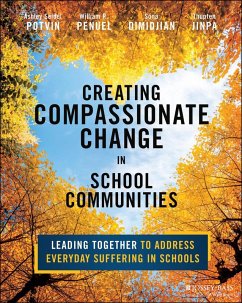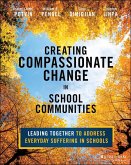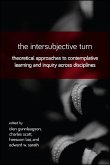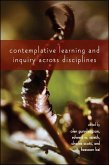Addressing everyday suffering in schools through compassion
Compassion and dignity provide an essential framework for building caring and inclusive schools. Many books focus on what teachers can do as individuals; Creating Compassionate Change in School Communities is different. This book focuses both on how educators can cultivate compassion within themselves and lead together to cultivate humanizing school environments. Teachers, librarians, counselors, resource specialists, mental health professionals, and social workers who are working to create conditions for compassion and dignity in schools are all leaders who can impact change. Offering concrete evidence and case studies that showcase the power of compassion to create flourishing school communities and rejuvenate education, the book will help all educators better serve K-12 students with school cultures that promote healing. Compassion can be cultivated, dignity can be affirmed, and leaders need skillful means to do so-tools and practices that can help them develop compassion for themselves and others and see their own dignity and that of others.
While we cannot fully address all the suffering that is happening in schools today, educators do have the power to work within themselves and together locally to create more compassionate responses to suffering and to affirm the dignity of all members of their school communities. Creating Compassionate Change in School Communities offers a valuable approach to integrating wellness into schools, as much for principals and superintendents as for teacher leaders, librarians, counselors, resource specialists, and others who work to create the conditions for compassion and dignity in their school.
Compassion and dignity provide an essential framework for building caring and inclusive schools. Many books focus on what teachers can do as individuals; Creating Compassionate Change in School Communities is different. This book focuses both on how educators can cultivate compassion within themselves and lead together to cultivate humanizing school environments. Teachers, librarians, counselors, resource specialists, mental health professionals, and social workers who are working to create conditions for compassion and dignity in schools are all leaders who can impact change. Offering concrete evidence and case studies that showcase the power of compassion to create flourishing school communities and rejuvenate education, the book will help all educators better serve K-12 students with school cultures that promote healing. Compassion can be cultivated, dignity can be affirmed, and leaders need skillful means to do so-tools and practices that can help them develop compassion for themselves and others and see their own dignity and that of others.
- Experiment and engage in meditation practices to strengthen personal capacity for mindfulness and compassion and the application to the classroom and school communities
- Engage in hands-on writing exercises and self-reflection questions educators can ask themselves and then apply their personal growth to influence school policies and climate
- Gain perspective on compassion in schools through a multidisciplinary lens drawing from contemplative practices, psychology, and organizational change theory
- Learn from stories and examples of K-12 educators who have exemplified compassion in action
While we cannot fully address all the suffering that is happening in schools today, educators do have the power to work within themselves and together locally to create more compassionate responses to suffering and to affirm the dignity of all members of their school communities. Creating Compassionate Change in School Communities offers a valuable approach to integrating wellness into schools, as much for principals and superintendents as for teacher leaders, librarians, counselors, resource specialists, and others who work to create the conditions for compassion and dignity in their school.
Dieser Download kann aus rechtlichen Gründen nur mit Rechnungsadresse in D ausgeliefert werden.









